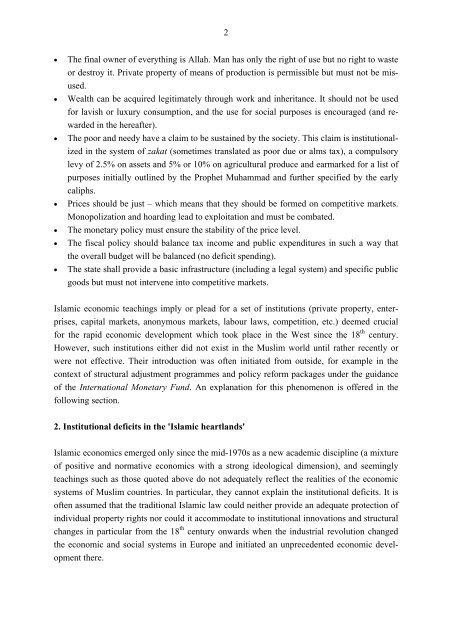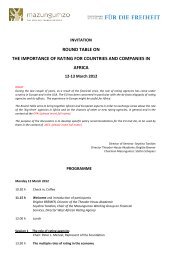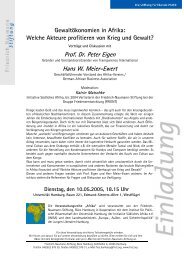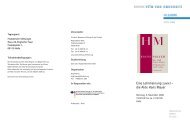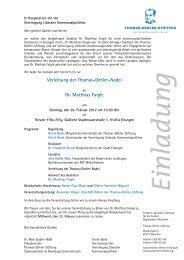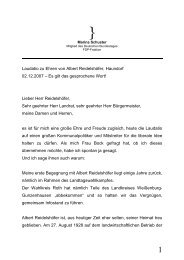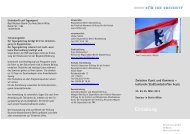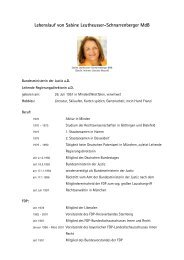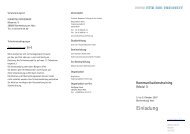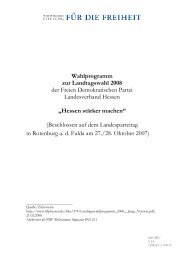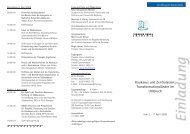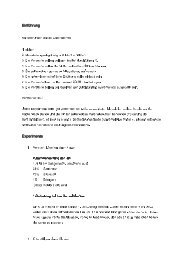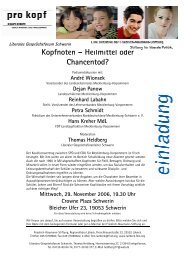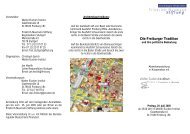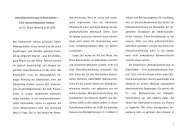Islamic Economic System – A Threat to Development? Volker ...
Islamic Economic System – A Threat to Development? Volker ...
Islamic Economic System – A Threat to Development? Volker ...
Create successful ePaper yourself
Turn your PDF publications into a flip-book with our unique Google optimized e-Paper software.
2<br />
• The final owner of everything is Allah. Man has only the right of use but no right <strong>to</strong> waste<br />
or destroy it. Private property of means of production is permissible but must not be misused.<br />
• Wealth can be acquired legitimately through work and inheritance. It should not be used<br />
for lavish or luxury consumption, and the use for social purposes is encouraged (and rewarded<br />
in the hereafter).<br />
• The poor and needy have a claim <strong>to</strong> be sustained by the society. This claim is institutionalized<br />
in the system of zakat (sometimes translated as poor due or alms tax), a compulsory<br />
levy of 2.5% on assets and 5% or 10% on agricultural produce and earmarked for a list of<br />
purposes initially outlined by the Prophet Muhammad and further specified by the early<br />
caliphs.<br />
• Prices should be just <strong>–</strong> which means that they should be formed on competitive markets.<br />
Monopolization and hoarding lead <strong>to</strong> exploitation and must be combated.<br />
• The monetary policy must ensure the stability of the price level.<br />
• The fiscal policy should balance tax income and public expenditures in such a way that<br />
the overall budget will be balanced (no deficit spending).<br />
• The state shall provide a basic infrastructure (including a legal system) and specific public<br />
goods but must not intervene in<strong>to</strong> competitive markets.<br />
<strong>Islamic</strong> economic teachings imply or plead for a set of institutions (private property, enterprises,<br />
capital markets, anonymous markets, labour laws, competition, etc.) deemed crucial<br />
for the rapid economic development which <strong>to</strong>ok place in the West since the 18 th century.<br />
However, such institutions either did not exist in the Muslim world until rather recently or<br />
were not effective. Their introduction was often initiated from outside, for example in the<br />
context of structural adjustment programmes and policy reform packages under the guidance<br />
of the International Monetary Fund. An explanation for this phenomenon is offered in the<br />
following section.<br />
2. Institutional deficits in the '<strong>Islamic</strong> heartlands'<br />
<strong>Islamic</strong> economics emerged only since the mid-1970s as a new academic discipline (a mixture<br />
of positive and normative economics with a strong ideological dimension), and seemingly<br />
teachings such as those quoted above do not adequately reflect the realities of the economic<br />
systems of Muslim countries. In particular, they cannot explain the institutional deficits. It is<br />
often assumed that the traditional <strong>Islamic</strong> law could neither provide an adequate protection of<br />
individual property rights nor could it accommodate <strong>to</strong> institutional innovations and structural<br />
changes in particular from the 18 th century onwards when the industrial revolution changed<br />
the economic and social systems in Europe and initiated an unprecedented economic development<br />
there.


